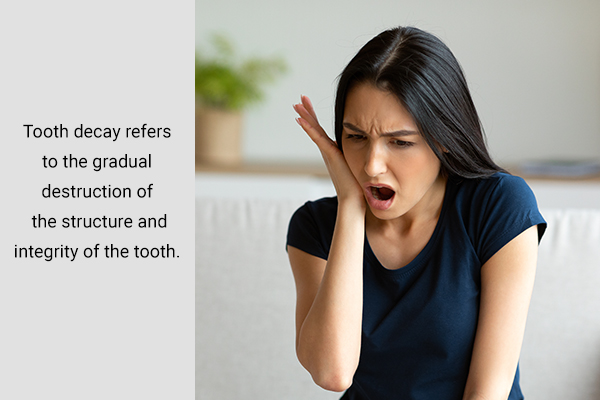In this article:
Gum disease, tooth pain, and other oral issues are usually not assigned the importance they deserve. A cursory understanding would have you believe that neglecting oral health is likely to have little to no impact on your overall state of well-being. However, the evidence points to the contrary.

The health of your teeth and gums has a direct influence on how you look, speak, chew, and taste food. Moreover, oral diseases and the noticeable discomforts associated with them can take a toll on your confidence and make some people shy away from socializing with you.
If left untreated, it can destroy the entire dental structure and result in tooth loss. Plus, infections that start in the mouth can spread further into the body to cause more serious complications.
So, instead of brushing off these concerns as insignificant, you might want to brush away the culprits that are causing them in the first place. Given the burgeoning costs of dental treatments, steadfastly adhering to a strict and regular oral health regimen can help you save hundreds of dollars.
What Makes for a Good Oral Hygiene Regimen?
- Make sure to brush your teeth twice daily, preferably with fluoridated toothpaste.
- Brushing your teeth after eating sugary or sticky foods can be particularly helpful in removing the residual gunk.
- Replace your old toothbrush with a new one every 2 to 3 months.
- Use alcohol-free mouthwash to rinse away bacteria. Moreover, people who are prone to developing cavities can benefit from using mouthwashes with fluoride content.
- Clean your tongue with a tongue scraper or toothbrush once daily to dislodge and remove bacteria and toxins from the tongue and thereby prevent bad breath.
- Because food particles tend to get stuck between your teeth and in the hard-to-reach recesses of the mouth, brushing your teeth alone may not prove enough to check plaque accumulation. In order to give your teeth a more comprehensive sweep, it is recommended to floss along with the daily dose of brushing.
- Because the bacteria present in dental plaque react with the sugar content of your food to release a corrosive acid responsible for tooth decay, it will help to limit the consumption of high-sugar foods.
- Using your teeth as tools for cracking hard-cased nuts, removing bottle caps, or rip opening packages can lead to chipping of the enamel, which renders the teeth more susceptible to potential denting and other damage. Try not to put your teeth through such trauma, and use your teeth only for chewing.
- Rinse your mouth with warm water after eating your meals.
- Chewing sugar-free gum after a meal can also improve oral health as it helps clean your teeth and stimulates saliva production.
- Eating cheese can help reduce cavities as it neutralizes plaque acid.
- Drinking fluoridated water between meals can help mitigate the risk of cavities. Unlike tap water which is usually fluoridated, packaged drinking water may or may not contain fluoride. Thus, always check the label on the bottle to be completely sure.
- Do not smoke or use smokeless tobacco.
- Acidic drinks eat away at your teeth enamel by dissolving its mineral content over time. So, if you wish to stave off potential cavities, try to limit your intake of acidic drinks such as colas, packaged fruit juices, and cordials.
- Include more foods rich in vitamin C in your diet.
- Take a vitamin D supplement, after consulting a doctor, to improve oral health.
- Eat crunchy fruits and vegetables such as guava, apples, carrots, and cucumbers after eating your meals.
- Wear a mouth guard while playing sports to shield your teeth from any impactful injury.
- Make sure to get regular dental checkups every 6 months. Routine oral exams and teeth cleaning by a professional are mandatory for safeguarding your oral health.
What Is Tooth Decay?

Tooth decay refers to the gradual destruction of the structure and integrity of the tooth. The hard outer coating, or enamel, of the teeth, tends to get covered with a thin film of bacterial plaque over time. (1)
Every time you eat anything starchy or sugary, the bacteria present in the dental plaque release an acid that adversely affects the mineral density of the enamel. Because plaque is essentially sticky in nature, the acid adheres to the enamel quite easily and continues to eat away the enamel and the layer underneath, called dentin.
This continued exposure to the corrosive acid gives way to cavities. The foundational step towards preserving your teeth is to prevent dental plaque buildup. Practicing adequate oral hygiene by brushing and flossing your teeth regularly can help in this regard. However, once a cavity forms, only a dentist can set the damage right.
Gum Disease
Gum disease, also known as periodontal disease, is the inflammation or infection of the soft tissue that surrounds and supports the teeth.
Much like tooth decay, gum diseases also spring from an accumulation of bacterial plaque in the oral cavity. The sign of healthy gums is that they form a tight cuff around your teeth, allowing hardly any space for plaque bacteria to grow.
Healthy gums are vital for strong teeth. However, unchecked plaque buildup can cause the gingival tissue to become inflamed and increasingly prone to bleeding while brushing or flossing.
The gums, or gingiva, are made of soft tissue, similar to that of the skin, and cover the bones that support your teeth. A form of relatively mild gum irritation called gingivitis is perhaps the first warning sign indicating the onset of periodontal disease.
The gum damage associated with gingivitis is still quite superficial and nascent and thus can be reversed with professional treatment and proper oral home care.
If gingivitis is not treated in a timely manner, the persistent gingival inflammation causes the seal between the gums and teeth to give way to form a space, or a “pocket,” between the two. These spaces in the gum margins allow further accumulation of debris and plaque, which is much harder to get rid of by your regular dose of brushing and flossing.
Moreover, this breach in the gumline allows bacterial infection to penetrate deeper into the gumline to ravage the tissue and bone structure that anchor the teeth in place.
As the supportive base of the teeth gradually weakens and the damage becomes irreversible, the chances for complete tooth loss becomes more and more imminent. (2)(3)
Risk Factors Associated With Oral Diseases

The following factors can further precipitate the onset of developing gum disease:
- Hormonal changes in girls and women undergoing puberty, menstruation, pregnancy, or menopause
- Smoking or chewing tobacco
- Certain medicinal drugs
- Genetics
- Diabetes
Final Word
Good oral hygiene is essential for good health. Whatever you eat goes through your mouth which necessitates that you keep it clean and healthy. If you are not particular about oral hygiene, your mouth will become a breeding ground for bacteria that can wreak havoc on your gums and teeth.
 Continue Reading10 Easy Home Remedies for Healthy Teeth and Gums
Continue Reading10 Easy Home Remedies for Healthy Teeth and Gums
- Was this article helpful?
- YES, THANKS!NOT REALLY


